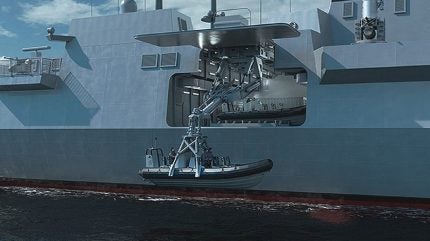
Rolls-Royce has entered an agreement to sell its Naval propulsors and Handling business to Fairbanks Morse Defense (FMD), according to an update from 19 September 2024.
The deal will comprise several units across North America, including a marine propeller and waterjet manufacturing base in Pascagoula, Mississippi; a critical ship propulsor systems hub in Massachusetts; as well as a centre for excellence in naval handling in Peterborough, Ontario.
Notably, Rolls-Royce will retain its Naval Gas Turbines and Generator Sets operations, which provide power dense solutions for naval propulsion and onboard power needs.
Both naval suppliers offer their services to the rapidly expanding US Navy. Though, the potential purchase, which is currently undisclosed, will mark one of those “distinctive moments that completely transform this company,” commented George Whittier, chief executive, FMD.
“The way that our products and services complement each other is unmatched in the defence industrial base.”
Complementary portfolios
Rolls-Royce supports more than 70 navies around the world. The company provides propulsion equipment – including controllable-pitch propellers, fixed-pitch propellers and waterjets – for a range of US Navy platforms, including frigates, destroyers, combatants, submarines, aircraft carriers, amphibious ships, fleet supprot and auxiliary ships as well as US Coast Guard cutters.
Likewise, the fast-growing US naval supplier, FMD, has built and maintained naval power and propulsion systems for more than a century. It has developed a diverse portfolio that now includes engines, electrical hardware, motors, valves, cranes, davit systems, fans, fittings, and water treatment solutions.
Naval handling systems
Rolls-Royce is a global leader in specialised naval handling systems though its Canadian centre of execellence in Ontario. Their systems have provided solutions for more than 35 years.
Particularly, the Mission Bay Handling System (MBHS) – the company’s latest handling system – offers an integrated solution for handling and stowing cargo, munitions, crewed and uncrewed offboard craft. The most recent customer is the UK Royal Navy, a service whose eight Type-26 City-class frigates will benefit from the new handling system well into the 2060s.
FMD strategic acquisitions
FMD is expanding its presence more widely in the US naval industry in response to global supply chain disruptures – overcoming the enduring effects of the COVID-19 pandemic and the more prescient geopolitical tensions to come.
Though FMD is known primarily as an engine manufacturer, the company has acquired 11 companies since the end of 2020, adding domestically produced motors, valves, water filtration equipment, fans, blowers, electrical system hardware and more to its product portfolio.
The US and its allies are forming unprecedented defence industrial ties. At the start of September, Hanwha Ocean, a ballooning Korean shipbuilder, was trusted to maintain a US Navy ship for the first time; an “historic moment,” the supplier remarked.
Despite the positive interchange, these efforts are prompted by an increasingly divided world in which the military aggression of China in the Pacific, and the layered crises in the Middle East, call for industrial unity and strength. This, of course, has negative effects on the global supply chain that Western industry had come to rely on during more than 20 years of globalisation.



